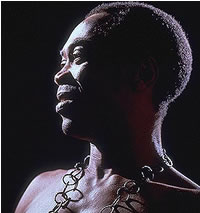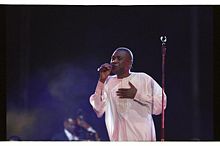 Youssou
N'Dour - Senegal
Youssou
N'Dour - Senegal
Play Clip
is one of the most celebrated African musicians in history. A renowned singer,
songwriter, and composer, Youssou's mix of traditional Senegalese mbalax
with influences ranging from Cuban samba to hip hop, jazz, and soul
has won him an international fan base of millions.
In the West, Youssou has collaborated with musicians Peter Gabriel, Axelle Red, Sting, Alan Stivell, Bran Van 3000, Neneh Cherry, Wyclef Jean, Paul Simon, Bruce Springsteen, Tracy Chapman, Branford Marsalis, Ryuichi Sakamoto and others. In Senegal, Youssou is a powerful cultural icon actively involved in social issues.
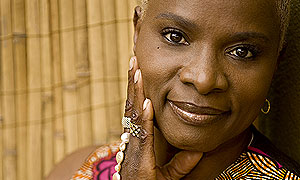 Anjelique Kidjo - Benin
Anjelique Kidjo - Benin
Play Clip
Her first performing
experience was as a six year old actor-dancer in her mother's theatre
troupe. From that point on, music became her sole passion. As a teenager,
Kidjo was inspired to write songs by the sounds of Hendrix, Santana,
Miriam Makeba, Fela Kuti, James Brownand others;
before her twentieth birthday she was one of Benin's few professional
female vocalists. When she was young she moved to Paris. Thriving in
the city's African music underground, she progressed from singer of Jasper
van' hof 's fusion band Pili Pili, to leader of her own band within five
years.
Established as one of Paris's top live acts, Kidjo was quickly discovered by Chris Blackwell and signed on Mango. Today, Angelique Kidjo is a bonafide global phenomenon whose performances are always legendary events
Her style of music varies from afro-funk, reggae, samba, salsa, gospel, jazz, Zairean rumba, souk and makossa which combined together creates her soulful unique sound of music.
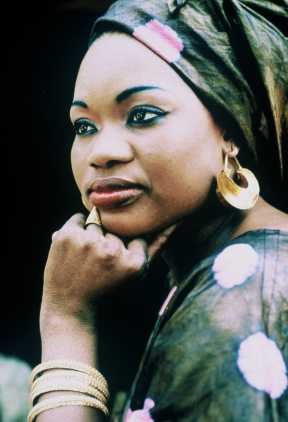 Oumou Sangaré - Mali
Oumou Sangaré - Mali
Play Clip
Was born in 1968 in Bamako, the capital
of Mali, her family, though, was from Wassoulou, in the southwestern region
of Mali. Sangare is the leading female star of the Wassoulou sound which
is based on an ancient tradition of hunting rituals mixed with songs about
devotion, praise, and harvest played with pentatonic (five-note) melodies.
Wassoulou has a strong Arabic feel along with the sound of the
scraping karinyang, women play the fle, a calabash strung
with cowrie shells, which they spin and throw into the air in time to the
music.
Sangare most often sings about about love and the importance of freedom of choice in marriage, an issue she feels strongly about because her father had two wives which Sangare thought was a "catastrophe."
In 1986, the eighteen-year-old Sangare toured Europe and the Caribbean with a 27-piece folkloric troupe, and at 21 she already had a huge hit in the album, Moussoulou (means "women") which sold over 200,00 legal copies and many more in the illegal pirate cassette trade.
Play Clip
Fela Anikulapo Kuti, born in Abeokuta, Nigeria in 1938,
was a singer-composer, trumpet, sax and keyboard player, bandleader, and
politician. Kuti was one of Africa's most controversial musicians and throughout
his life he continued to fight for the rights of the common man (and woman)
despite, harassment, and even imprisonment by the government
of Nigeria.
Born to Yoruban parents, Kuti was strongly influenced by both parents, his mother being Funmilayo, a leading figure in the nationalist struggle. Practically all of his records are dominated by political events
In 1954, Kuti joined the Cool Cats as a singer. During this period Kuti developed his own unusual sound which he described as highlife-jazz. In 1968 Kuti announced the arrival of Afro-beat, within the year was promoting his sound all over the USA on a 10-month tour where he became influenced by American jazz.
When he returned to his homeland he opened a nightclub, the Shrine, and changed the name of his band to Africa 70 (and later to Egypt 80). His bands traditionally included the typical huge line-up consisting of many singers and dancers, numerous saxophonists, trumpeteers, drummers, percussionists, and of course, many guitarists blending African rhythms and jazz horn lines with politicized song lyrics. Entire recordings often consisted of just a few songs He also refused to perform his songs after recording them, and this led to audience disinterest in the U.S. where the people wanted their music to be recognizable hits.
Kuti continued his outspoken attacks on the Nigerian government. When the people returned to power in 1979, Kuti began his own political party - MOP (Movement of the People). The military returned to power in 1983 and within the year Kuti was sentenced to five years in prison on a spurious currency smuggling charge. He was released in 1986 after yet another change of government.
Fela Anikulapo Kuti died on Saturday, August 2, 1997, at 4pm (local time) in Lagos, Nigeria. It had been rumoured for some time that Fela had a serious illness he was refusing treatment for, many said he was suffering from prostate cancer. But as it turns out, Fela died from complications due to AIDS. As Fela's brother, Olikoye Ransome Kuti, said at a news conference:
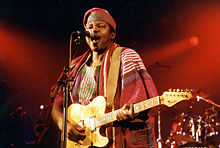 King
Sunny Ade - Nigeria
King
Sunny Ade - Nigeria
Play Clip
Sometimes
also called the Minister of Enjoyment, was born in Oshogbo,
Nigeria in 1946, the son of a Methodist minister. He began his musical
career when, after dropping out of grammar school, he drifted to Lagos
and joined a highlife band. Inspired by the music of I.K. Dairo, he joined
the Rhythm Dandies, led by Moses Olaiya (later known as Baba Sala, Nigeria's
preeminent funny man and a prolific film maker). King Sunny was influenced
by the legendary Tunde Nightingale (early Juju pioneer extraordinare) and
borrowed stylistic elements from Nightingale's 'So wa mbe' style of juju.
In 1966 he formed his own band, the Green Spots. After a long eight years in which they recorded 12 LPs for the Nigeria-Africa Song label, in 1974 he entered into increasingly annoying contract hassles and a public court case. This experience prompted him into forming his own recording company linked to Decca Records. At this time he changed the name of his band to the African Beats.
King Sunny Ade and The African Beats tour with the typically large African line-up of 20-30 members. They play a spacey, jamming sort of Juju, characterized by tight vocal harmonies, intricate guitar work, backed by traditional talking drums, percussion instruments, and even adding the unusual pedal steel guitar and accordian.
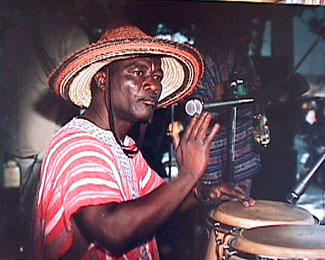 Kwashi (Adonu
Amevuvor) - Ghana
Kwashi (Adonu
Amevuvor) - Ghana
was born in the village of Dzodze
located in Southern Ghana. Kwashi's father was the chief drummer of his
village and his mother was a dancer and composer. Kwashi and his family
of four sisters and seven brothers all followed in their father's footsteps
becoming performers of traditional Ghanian music and dance.
Kwashi came to the US in 1979 via a stint in Germany where he was invited to teach workshops and perform at the Berlin Festival. Prior to that, in 1975, he played percussion with the Youth Organization of Orchestras by invitation of the British government. In London the group played for many different audiences including the Queen in Buckingham Palace. While there he also did a recording for the BBC.
Kwashi settled in Los Angeles in the early 1980s and began teaching music and African culture, in addition to having his own percussion store for a time, the Adonou International Music Center. He also appeared and played in the films The Color Purple, Coming To America, and Under Fire. He continues to perform, compose, and offer libations at many African-themed events around town.
